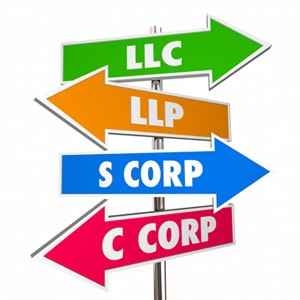
Posted Wednesday, October 18, 2023
There are three basic small business entities with variations within. The three basic are-
- Limited Liability Company (LLC), the crowd favorite
- Limited Liability Partnership (LLP) or General Partnership (GP), the legacy dinosaur
- C Corporation (for profit), and the Personal Service Corp
There is an additional entity subtype with the “Professional” prefix. Some states require certain professionals, such as doctors, attorneys, accountants and engineers, to be a Professional LLC (the PLLC) or a Professional Corporation (the PC). Since you don’t see too many LLPs these days, you don’t see too many PLLPs either.
Two notables missing from the list. First, sole proprietors are not an entity nor is the variant or close cousin of “Doing Business As” (DBA). If you wake up and want to sell used copiers, you can, right now, without any formalized structure. It is not smart, but certainly permissible. At times sole proprietors are interchanged with single-member limited liability companies (SMLLC) since the IRS and most states consider a SMLLC to be a disregarded entity for taxation, and both a sole proprietorship and a SMLLC will end up on Schedule C of your Form 1040. However, they are truly different in several underlying ways.
Also note how an S corporation is not listed. It is not an entity. It is a taxation election. The underlying entity has to be one of the above, and usually it is an LLC (either single-member or multi-member) for the ease of formation including documentation.
Spoiler Alert: In California, it is preferred to create a C corporation or convert to one if you are also electing S Corp taxation. Why? When you pay a reasonable salary to the shareholders, they must pay into California’s State Disability Insurance (SDI) plan. However, as corporate officers, they can opt-out. But! LLCs do not have officers; they have managers and members. As you will learn in this book, when invoking the S Corp election, the underlying entity does not change. Ergo, LLCs taxed as an S corporation in California cannot opt-out of SDI which can save over $1,000 annually.
Let’s chat about each of these entities in turn. Here we go…
Jason Watson, CPA, is a Senior Partner of WCG CPAs & Advisors, a boutique yet progressive tax,
accounting and business consultation firm located in Colorado serving clients worldwide.
Taxpayer's Comprehensive Guide to LLCs and S Corps 2023-2024 Edition
This KB article is an excerpt from our 400+ page book (some picture pages, but no scatch and sniff) which is available in paperback from Amazon, as an eBook for Kindle and as a PDF from ClickBank. We used to publish with iTunes and Nook, but keeping up with two different formats was brutal. You can cruise through these KB articles online, click on the fancy buttons below or visit our webpage which provides more information at-
| $59.95 | $49.95 | $39.95 |
Taxpayer's Comprehensive Guide to LLCs and S Corps 2023-2024 Edition

